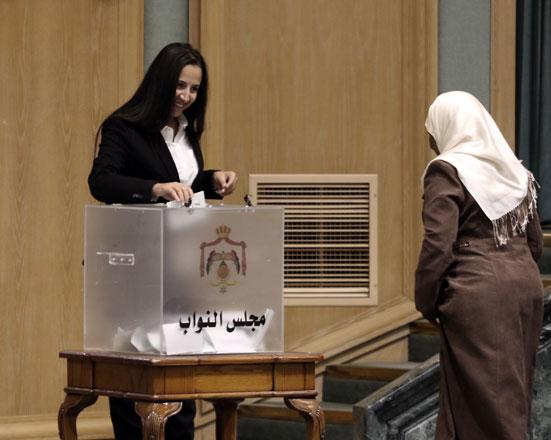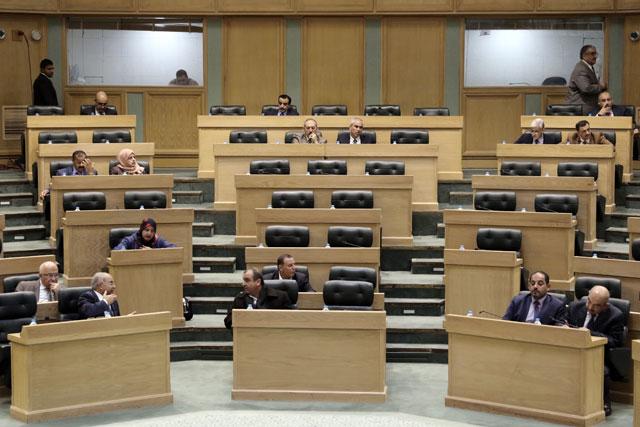You are here
Mulki’s government wins vote of confidence
By JT - Nov 25,2016 - Last updated at Nov 25,2016

Prime Minister Hani Mulki addresses MPs as he responds to their remarks ahead of the vote of confidence on Thursday (Photo by Osama Aqarbeh)
AMMAN — The government of Prime Minister Hani Mulki on Thursday won House’s vote of confidence with a majority of 84 out of the 128 deputies present.
The voting process took place immediately after Mulki delivered his response to the deputies’ remarks that were made over the government policy statement.
A total of 40 deputies voted “nay,” while four MPs abstained and two were absent.
In his remarks, the premier responded to the majority of the MPs’ demands and points of criticism.
Mulki promised to institutionalise the relationship between the executive and legislative authorities and to adopt an active continuous dialogue regarding public affairs without violating citizens' constitutional right in holding officials accountable for bad performance and overseeing the Cabinet's work.
He said that those who implement favouritism and nepotism in their lives are enemies of the country, taking rights that are not theirs and that those who abuse public money through favouritism are stealing the future of Jordanians.
As for the public debt, the premier said its ratio to the gross domestic product (GDP) poses a “strategic challenge” as has surpassed safe levels, highlighting the reform programme the government has drawn up “without foreign interference” to stimulate economic growth and reduce the budget deficit, noting that Jordan has preserved its financial and monetary stability to a large extent despite the debt's current levels, estimated at about 93 per cent of GDP.
He said that unemployment and poverty are interlinked and addressing them is a top national priority because they reflect the economy's inability to generate enough jobs. He noted that one cannot ignore the presence of 1.2 million guest workers in various sectors.
Mulki announced that bread and basic commodities will remain subsidised and their prices will never be increased, but, at the same time, he said the government will take administrative and technical measures to control the waste of subsidies that go to undeserving parties.
As for energy, the premier said that work is currently under way to bring liquefied gas from Iraq, Algeria, Cyprus, Egypt and Palestine, and that the government has held meetings to discuss importing natural liquefied gas from Qatar and Algeria but could not get any competitive offers yet.
Thus, he noted that the agreement with Noble Energy, a Houston-based company that holds the largest share in the Israeli Leviathan gas field, will provide 40 per cent of the Kingdom’s needs of gas and save around $600 million annually as the country will give up reliance on heavy oil for electricity generation, the Jordan News Agency, Petra, reported.
Earlier, lawmakers completed the discussion over the government’s policy statement that Mulki delivered last week.
The 130-strong House had decided earlier to allocate 15 minutes to each deputy and 30 minutes to each bloc to take the podium.
During the fifth session, lawmakers maintained their focus on problems facing the Kingdom in general and their constituencies in particular, which are mainly related to transportation, education, economy, health and labour.
Deputy Haya Mifleh (Balqa, women’s quota) called for revisiting regulations governing the General Secondary Education Certificate Examination (Tawjihi) and the higher education, and empowering women through providing them with appropriate jobs, especially in remote areas.
For his part, MP Awad Zawaideh (Southern Badia) warned against raising prices and taxes in the beginning of next year, noting that salaries of employees at the civil and military sectors cannot tolerate any further increases, due to the already high prices, Petra reported.
He also highlighted the importance of supporting national media, due to the spread of hate speech, violence, terrorism and extremism that, he said, negatively affect the young generation.
Lawmaker Shuaib Shdeifat (Mafraq) stressed that the rule of law is key to building a civil state, noting that Mulki’s keenness on ensuring this principle reflects the government’s commitment to overcoming all challenges and going on with the envisioned reform.
MP Nabil Shishani (Zarqa’s 1st district, Circassian/Chechen seat) warned against what he called consequences of the policy statement’s intention to “activate laws that would compromise the freedom of expression”, and called for directing enough attention to the youth to help them contribute to society’s development and prosperity.
Deputy Mohammad Riyati (Aqaba) warned against “tampering with” school curricula, especially the Arabic language and Islamic education courses, calling for protecting children from the hazards of the Internet, which contains “recruiters for extremism”.
MP Rashed Shouha (Irbid, 1st district) said that the policy statement comprises several programmes which respond to the difficult circumstances the country is going through, yet it lacks a fixed timeframe for implementation.
Meanwhile, MP Marzouq Habarneh (Zarqa, 1st District) asked whether the government actually has plans to work out solutions to poverty pockets, calling for raising the minimum monthly wage to at least JD300, and increasing the pensions of civil and military retirees.
For his part, MP Abdullah Akaileh (Amman, 1st District) highlighted the participation of the group he heads, the National Coalition for Reform, in the political pluralism experiment and that the House’s power is part of the people’s power, calling on lawmakers to exhibit civilised behaviour that reflects a high sense of responsibility.
The Islamist said that he is with improving scientific curricula but criticised the recent amendments to school textbooks.
Regarding the Elections Law, the deputy said that it is time to come up with a new elections law based on the law of 1989, lamenting the “fading authority” of the executive power.
Related Articles
AMMAN — The Lower House is scheduled to hold a vote of confidence session on Prime Minister Hani Mulki's government today, Speaker Atef Tara
AMMAN — The Lower House on Tuesday completed electing its permanent office members in the presence of Lower House Speaker Atef Tarawne
AMMAN — The Lower House approved the draft environment protection law on Tuesday after an extended discussion during a legislative session,

















